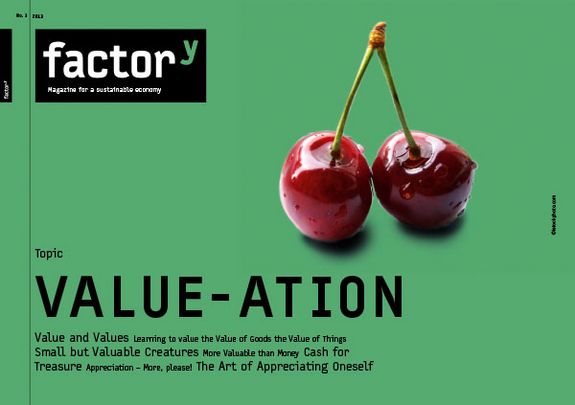Value-ation

Nowadays, employees and clients associate corporate culture with different moral concepts. Not only economic success is relevant but also social appreciation. The following examples will show that social appreciation also ensures an increase in value.
By Elita Wiegand
(Translated from the German by Miriam Eckers, Sina Brauch, Ruthild Gärtner, Susanne Mollen and Theresa Lupek)
Appreciation as part of a corporate culture is in conflict with profit maximisation and gains. It takes time and energy and its specific success is not really quantifiable. Social appreciation is one of the soft facts and there would be no time for any of those in hard times if it weren't for the clients and employees. They are characterised by an increased sense of responsibility and environmental awareness and they are also less committed to companies in which appreciation clearly doesn’t matter. With the increasing shortage of skilled workers and the pressure on companies to distinguish themselves from competitors, the soft facts become hard facts. Enterprises are forced to reconsider and improve their corporate culture and values. With keywords such as social responsibility, CSR (Corporate Social Responsibility), and sustainable economy, also the media has taken up the issue of an appreciative corporate culture. Although these measures are currently voluntary for enterprises, they are increasingly becoming a popular differentiating feature.
Now, the only question is whether this is just a trend or an actual sign of long-term change. In times of global economic crisis and fierce competition, is it even possible for enterprises to be economically successful while basing their corporate culture on ethical values? The free-market liberal economist and Nobel laureate Milton Friedman says in his often cited article on the role of businesses in society that: “[t]he social responsibility of business is to increase its profits”. In other words, the ultimate objective of an enterprise is profit maximisation. Most entrepreneurs share this view and argue that they could not afford to integrate values into their corporate culture since, the enterprise and thus the workplaces have to survive under the conditions of competition. But are values and economic success really incompatible?
Businesses are required to comply with values
A group of scientists, Peus, Traut-Mattausch, Kerschreiter and Frey at the Ludwig Maximilian University of Munich, carried out a study for the Center for Leadership and People Management. According to this study, a corporate culture based on values is able to raise profits, increase the employees’ contributions to meetings and reduce staff fluctuation over the medium and long term. Likewise, the study has shown that fewer employees have taken sick leave and even the reputation of the business has improved, because the employees have represented the company in a more positive light when in interaction with clients.
It is a fact that nowadays there is no enterprise that can simply ignore the topic of appreciation. Many businesses are undergoing a change in values and are making CSR part of their culture. They are required to comply with value-based management in accordance with stakeholder values that are also claimed by the shareholders. The number of sustainability reports indicating the internal and external values is growing, and establishing appreciation in companies has become a topic for consultants. The consulting agency Great Place to Work, for example, operates all over the world and supports businesses in creating an employee-oriented workplace culture. Key values such as trust, respect, credibility, fairness, pride, and team spirit are examined more closely.
The institute conducts its own studies and draws up its own rankings. Its finding: among Germany’s best employers, the commitment of employees has increased, absences from work have been reduced and recruiting costs have been lowered.
Competitions such as the top 100 rankings in ‘Ethics in Business’ or ‘Best Employer among Medium-sized Businesses’ establish alliances of businesses that live up to values and pave the way for a responsible economic increase in value. It is becoming increasingly attractive to distinguish and to position one’s business with valuation. According to Werner Drechsler of the Düsseldorf-based Druckstudio Group, it is nevertheless not enough to be distinguished as one of Germany’s best employers. He says that it is rather an ongoing process to maintain the value orientation and to work on it. The fee-based participation in the competition ‘Germany’s Best Employer’ has paid off for the Druckstudio Group. Since then, the order backlog has improved steadily; the company has become more widely known and has acquired new customers through recommendations.
Taking on responsibility
Furthermore, social valuation in companies influences the value culture and the shaping of values in society. People do not want to be valued as employees only. They seek meaning in their work; they want to be involved in innovations that not only benefit the company and help to sell its products, but that also contribute to improving living conditions. The corresponding strategic management approach is referred to as ‘positive leadership.’ It is based on the positive psychology of American psychologist Martin Seligman. The idea includes a value culture in the company and promotes its strengths and talents. This results in the ‘flow’, as researcher Mihaly Csikszentmihalyi calls the change: companies positively change their corporate culture when the work is meaningful and important for society. The environmental compatibility of products, their sustainability or social projects are meaningful and valuable.
Longing for meaning
Anthroposophical business formations such as the chemist’s chain dm, WALA, Alnatura or the GLS Bank, practise the creation of meaning per se. They have elevated the value culture to their corporate principle. The founders are close to the ideas of Rudolf Steiner; their first employees are for the most part also inspired by anthroposophy. The value system is based on the encouragement of employees, respect for the individual and for nature. Only recently, Götz Werner, the founder of dm, has emphasised that when someone does not feel valued he cannot make progress. According to him, the problem nowadays is that often the maxim ‘trust is good, control is better’ applies. He says that distrust ruins every commitment to management. This culture of trust is rewarded: every day, 1.5 million people shop at the dm sundries chain, resulting in annual turnover of EUR 7.69bn.
While the managers of the anthroposophical companies follow their basic principle, many owners of medium-sized businesses are simply guided by traditional values. For Kirstin Walther, head of the juice press house Walther in Dresden, honesty, reliability and respect are especially important. She says that she wants employees to like working at her company, to feel comfortable and to be happy. Walther has adapted her business to this strategy. She says that ever since, she has been acquiring customers who value her and her products more.
Valuable crisis
Sometimes, however, companies have to face a crisis before they begin to consider values. Manufacturing at a lower price, reducing labour costs and saving taxes: these were the decisive factors for Lemken, a manufacturer of agricultural machinery, to relocate from the Lower Rhine to Russia. The Russian sense of quality, however, was by far not consistent with the standards of Lemken. Materials were mixed up, dimensions were not adhered to, products rusted due to incorrect storage. Lemken remorsefully returned to Germany. The positive effect of the turnaround: the manufacturer changed the value culture in the company. Rigid structures were eliminated, hierarchies were flattened and work processes were optimised. Lemken introduced ‘production cells’ where teams plan and act independently. Every day, the latest business figures are announced on notice boards in the factory buildings, thereby providing transparency. Now, the company even refrains from imposing fixed working hours. Chief executive Nicola Lemken says that they are giving their employees considerable liberty that is based on trust. Furthermore, employees are motivated by a profit-sharing system. The amount anyone can pay into the company in the form of working hours or cash ranges from EUR 150 to EUR 900. If three fourths of the targeted profits are achieved, the employee gets his money back. If profits increase, the amount rises. Entrepreneurs and employees are in agreement: the contribution to the success of the company, open communication, valuation and respect provide for a good working atmosphere.
Large Businesses with Values
In groups and large businesses, the positive leadership principle works the same. Already in the 1940s, William McKnight, the former CEO of the 3M technology group and manufacturer of adhesive products, established corporate guidelines according to valuation, confidence and individual initiative. Today, they are still in force and are constantly being updated.
The employees assess their employers positively because they are satisfied, thus the company is in the top 40 in the world’s sustainability ranking ‘Best Global Green Brands’ and has been honoured many times as Germany’s best employer. For its employees, 3M offers, for example, flexible working hours so that the employees can integrate their work in their personal lifestyle. The different working models range from home offices to special working hours for mothers or fathers, which allow them to come to the office only on certain days. The company offers day care services at its locations where employees can place their children under three years old.
For the company it is important that everybody can decide for himself when he wants to do his work. The corporate culture is based on trust. This can also be seen in management. While many companies send their employees to workshops to get rid of their weaknesses, 3M encourages its employees to build on their strengths. Every superior speaks with an employee about his contribution to the company’s success and defines common measurable objectives. The personnel manager of 3M, Jörg Dederichs, explains that dialogue is very important for them since it contains value. Furthermore, he says that it is also part of the dialogue to ask for positive things like: What does the employee like to do? What is his hobby? What brings him joy?
Elita Wiegand is a journalist and chief editor of the Internet portal WerteWandel.biz
More on values, its estimation and appreciation here in topics and more beautiful and detailed in the factory-magazine Value-ation. The free available PDF-magazine contains additional citations and numbers, is finely designed and well readable on tablets and screens.
Beiträge online
VALUE-ATION

- Worth and Values
- Learning to value the value of goods
- Worth more than money
- Appreciation – more please!
- Bares für Wertvolles
- Die Kunst, sich selbst zu schätzen
Themen
- The Domino Effect: the Mobility Transition as an Engine for the ‘Great Transformation’
- Cities Use the Space
- Decarbonization by 2030
- The fear of biting the hand that feeds you
- Where investing is a pleasure
- Why divestment is going to change the world
- A Robin Hood tax for climate protection
- May the Force Be with Us
- Modern Strategies
- The prerogative of interpreting the future now lies with the companies involved in climate protection”
- From Negotiating to Trading Equitably
- Can a donkey be tragic?
- Rethink rather than rebound: a sufficiency revolution must precede the efficiency revolution
- On Rebound, Prebound and Performance Gaps
- So Let Us Seize Power Then!
- With Common Property Against Political Failure
- So Let Us Seize Power Then!
- The Comforting Beauty of Failure
- “It Is Not Impossible at All.“
- Resource-light shopping
- Men Have Not Stopped Giving the Advantage to Women – So Far
- Toothpaste for Princesses and Soup for Pirates
- It is about equality
- A nice day
- Initiative instead of frustration
- The right ingredients
- Resilient for Life
- Not only, but also
- Appreciation – more please!
- Worth more than money
- Learning to value the value of goods
- Worth and Values
- The Transformative Power of Science
- Historically effective: How innovation and technology transform
- The Disappearance of Products
- Growing Older 101
- Columbus’ Egg
- It Works! In Theory at Least ...
- What If...?
- Analysing Separately – Thinking and Acting Together!
- Let’s Break Away from Determined Breaking Points
- More Gold in Waste than in Mines
- The art of separation
- Should you really DIY?
- The Aesthetics of Do-It-Yourself
- Standing on One’s Own Feet
- From the handaxe to desktop fabrication
- Using Shares to Survive the Crisis
- When Citizens participate
- Possess to Participate
- The Right Growth at the Right Time
- Gunter Pauli and Blue Economy
- When Sustainability Grows
- How we treat Growth
- Illusions about Growth

